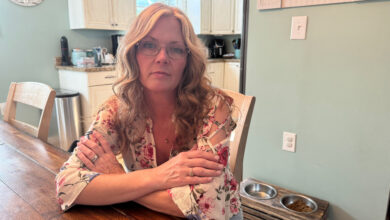
Jean White’s mother has dementia and moved into a memory care facility near Tampa, Florida, just as coronavirus lockdowns began in spring 2020. For months, the family wasn’t allowed to go inside to visit.
They tried video chats and visits from outside her bedroom window, but White said that just upset her mom, who is 87. White’s mother couldn’t grasp why she could hear familiar voices but not be with her loved ones in person.
When the family was allowed in, disruptions continued. White said the facility shut down whenever a resident or staff member had the virus.
All the while, her mom’s memory was deteriorating.
Restrictions on visitation eventually relaxed, White said, but she questions whether protecting her mom from covid-19 was worth the lengthy separation. “What anxiety, loneliness, and confusion she must have had — I think I would have rather her seen her family,” she said.
Florida Gov. Ron DeSantis signed a bill April 6 that will make it easier for people like White to see their loved ones in health care facilities. Before Florida, at least eight states had passed similar laws, and several others have bills under consideration.
Some laws, like those passed last year in New York and Texas, are specific to long-term care facilities. They allow residents to designate essential caregivers, also known as compassionate caregivers, who are allowed to visit regardless of whether there is a health crisis. Texans also added protections in their constitution.
Other states — including Arkansas, North Carolina, and Oklahoma — passed similar “No Patient Left Alone” laws that guarantee visitor access to patients in hospitals.
Hospitals and long-term care facilities set pandemic restrictions on visitors to protect patients and staffers from infection. But supporters of these new laws said they want to ease the restrictions because the rules may have harmed patients.
An Associated Press investigation found that for every two residents in long-term care who died from covid-19, another resident died prematurely of other causes. The report, published in late 2020, attributed some of those deaths to neglect. Other deaths, listed on death certificates as “failure to thrive,” were tied to despair.
Even in regions of the U.S. with low rates of covid, the risk of death for nursing home residents with dementia was 14% higher in 2020 than in 2019, according to a study published in February in JAMA Neurology.
The researchers pointed to factors besides covid infection that may have contributed to the increased mortality, such as reduced access to in-person medical care and community support services and “the negative effects of social isolation and loneliness.”
Woman Took a Job at Facility to Be Near Her Husband
When long-term care facilities and hospitals began closing their doors to family visitors, patient advocate Mary Daniel of Jacksonville, Florida, was worried about what might happen to her husband, Steve, who has Alzheimer’s disease. “I promised him when he was diagnosed that I would be by his side every step of the way, and for 114 days I was not able to do that,” Daniel said.
To get back inside, Daniel took a dishwashing job at her husband’s assisted living facility so she could see him. Daniel worked in the kitchen two nights a week and went to his room after her shift. She helped him change into his pajamas and lay beside him watching TV until he fell asleep. “That is really why I’m there, to be his wife, to hold his hand, so he feels that love,” Daniel said.
Daniel has been fighting for visitor rights at the state and federal levels ever since. She’s a leader of Caregivers for Compromise, a coalition with thousands of members. She also served on a state task force that informed Florida’s decision to order long-term care facilities to reopen to families in fall 2020.
“We understand that covid kills, but we want to be sure everyone understands isolation kills, too,” Daniel said.
The visitation laws also include provisions to protect patients and staffers by directing facilities to establish infection-control measures that families must follow to enter. That could mean mask requirements or health screenings. In Florida, protocols for visitors cannot be more stringent than they are for staff members, and vaccination status can’t be a factor.
Also in Florida, facilities can ban visitors who don’t follow the rules. That’s fine with advocates like Daniel. “I mean we’re not here beating down the door saying, ‘You can never kick us out, and I’m going to be here as long as I want to,’” she said. “We want to be sure that everything is safe.”
DeSantis, who appointed Daniel to the 2020 task force, was a vocal supporter of expanding visitor access. “Covid cannot be used as an excuse to deny patients basic rights, and one of the rights of being a patient, I think, is having your loved ones present,” DeSantis said at a news conference in February.
Balancing the Joy of Visits With the Risks of Infection
In November, the Centers for Medicare & Medicaid Services directed nursing homes to open their doors to visitors even amid covid-19 outbreaks, so long as they screen visitors to determine whether they have tested positive or have symptoms of covid-19.
Hospitals and assisted living facilities are not regulated in the same way as nursing homes. Some health care industry leaders fear the new laws for hospitals and assisted living facilities won’t provide operators the flexibility they need to respond to crises.
Veronica Catoe, CEO of the Florida Assisted Living Association, represents facilities with varying capabilities to accommodate visitation. Some are large with private rooms and multiple common areas; others are single-family homes that just have a handful of residents.
“These operators are trying to protect not only the loved one that wants a visit, but also the loved one that doesn’t want these outsiders coming in. They both have resident rights,” Catoe said.
Florida’s law outlines various scenarios during which visitation must be allowed at all times. Those include if a patient is dying, struggling to transition to the new environment, or experiencing emotional distress, among other factors.
Catoe said those situations aren’t always easy to define. “Is it the facility that makes that decision, is it the family that makes that decision, or is it the resident?” she asked. “And when they’re in conflict, who gets the deciding factor?”
Relatives Wanted More Time With a Dying Loved One
Mary Mayhew, president of the Florida Hospital Association, said the decision is also difficult for medical centers. “They are extremely reluctant to place restrictions on [visitor] access, and it has largely been done during this extremely unusual time period when we have had a virus — continue to have a virus — that we are often learning something new about every day,” Mayhew said. She added that people go to hospitals because they’re already sick or injured, which makes them vulnerable to infection.
She said families are vital to patient care and stressed that even during covid surges and lockdown, hospitals have tried to get relatives in to visit, especially when patients were dying.
Kevin Rzeszut said his family needed more.
In August, when Tampa hospitals were overwhelmed with patients sick with the delta variant, Rzeszut’s father died from a bacterial infection at age 75. “By the time we saw him, I mean, he was gone,” Rzeszut said. “There was no consciousness left; he was on so many medications.”
He couldn’t visit his dad for nearly two weeks, he said.
He said the staff did the best they could. “The nurses and doctors, they can look at notes all day long, but they don’t know him,” Rzeszut said. Rzeszut’s mother spent 53 years with his father, Rzeszut said, and “she’d be more attuned to minor improvements or degradations. Maybe that’s a pipe dream, but it feels real.”
Rzeszut said he supports measures to give families more access to their loved ones, so long as enforcing them doesn’t add more workload to an “already overburdened” health care system. What he really wishes, he said, is that more people would take covid seriously so people didn’t need a law to visit their loved ones.
This story is part of a partnership that includes NPR, WUSF, and KHN.
KHN (Kaiser Health News) is a national newsroom that produces in-depth journalism about health issues. Together with Policy Analysis and Polling, KHN is one of the three major operating programs at KFF (Kaiser Family Foundation). KFF is an endowed nonprofit organization providing information on health issues to the nation.
USE OUR CONTENT
This story can be republished for free (details).


